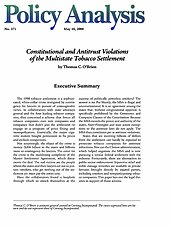The 1998 tobacco settlement is a sophisticated, white-collar crime instigated by contingency fee lawyers in pursuit of unimaginable riches. In collaboration with state attorneys general and the four leading tobacco companies, they concocted a scheme that forces all tobacco companies–even new companies and companies that didn’t join the settlement–to engage in a program of price fixing and monopolization. Essentially, the major cigarette makers bought permission to fix prices and exclude competitors.
Not surprisingly, the object of the crime is money–$206 billion to the states and billions more to contingency fee lawyers. The cover for the crime is the maddening complexity of the Master Settlement Agreement, which documents the deal. The real victims are the people whom the states and their lawyers set out to protect–smokers, who get nothing out of the settlement yet must pay the entire cost.
Have the collaborators found a loophole through which to enrich themselves at the expense of politically powerless smokers? The answer is no. Put bluntly, the MSA is illegal and unconstitutional. It is an agreement among the states that, without congressional approval, is specifically prohibited by the Commerce and Compacts Clauses of the Constitution. Because the MSA exceeds the power and authority of the states, Noerr-Pennington and state action exemptions to the antitrust laws do not apply. The MSA thus constitutes per se antitrust violations.
States that are receiving billions of dollars from the settlement can hardly be expected to prosecute tobacco companies for antitrust infractions. Nor can the Clinton administration, which helped negotiate the MSA and is now pursuing a similar federal settlement with the industry. Fortunately, there are alternatives to public-sector enforcement. Injunctive relief and treble damage remedies are available in private lawsuits brought directly by injured parties, including smokers and nonparticipating tobacco companies. This paper lays out the legal theories in support of those actions.
About the Author

This work is licensed under a Creative Commons Attribution-NonCommercial-ShareAlike 4.0 International License.
